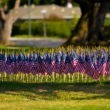Days after the president’s second term acceptance speech, which was full of optimism for the blessed success of democracy and freedom in Iraq, the Middle East and the world, the White House revealed that, on top of the $25 billion in “emergency spending” in Iraq already approved for this year, it will ask Congress for another $80 billion supplemental appropriation.
This year the cost of military operations in Iraq and Afghanistan is expected to exceed $100 billion. That will bring the cost so far of the wars in those two countries to at least $280 billion, far exceeding earlier estimates. The death of 1,380 American troops in Iraq also exceeds forecasts.
On January 21 the Knight Ridder newspapers published a rarely seen gloomy analysis of the current and future outlook, calling the war in Iraq a loser. Because it was not widely cited elsewhere we decided to print some of it here.
What follows was written by Tom Lasseter, reporting from Baghdad and Mosul; Jonathan Landay, reporting from Washington; and by Knight Ridder correspondent Ken Dilanian from Fallujah, with the help of a local assistant who was not named for security reasons:
“The United States is steadily losing ground to the Iraqi insurgency, according to every key military yardstick. . . . Through all the major turning points that raised hopes of peace in Iraq, including the arrest of Saddam Hussein and the handover of sovereignty at the end of June, the insurgency, led mainly by Sunni Muslims, has become deadlier and more effective. . . .
“U.S. military fatalities from hostile acts have risen from an average of about 17 per month just after President Bush declared an end to major combat operations on May 1, 2003, to an average of 82 per month.
“The average number of U.S. soldiers wounded by hostile acts per month has spiraled from 142 to 808 during the same period. Iraqi civilians have suffered even more deaths and injuries, although reliable statistics aren’t available.
“Attacks on the U.S.-led coalition since November 2003, when statistics were first available, have risen from 735 a month to 2,400 in October. . . .
“The average number of mass-casualty bombings has grown from zero in the first four months of the American occupation to an average of 13 per month. . . .
“Most worrisome, the insurgency is getting larger. At the close of 2003, U.S. commanders put the number of insurgents at 5,000. Earlier this month, Gen. Mohammed Abdullah Shahwani, the director of the Iraqi intelligence service, said there are 200,000 insurgents, including at least 40,000 hard-core fighters. . . .
“The resistance has grown despite suffering huge casualties to overwhelming U.S. firepower. . . . American soldiers have subdued Sunni hotbeds such as Fallujah and Samarra. Yet these military victories have failed to achieve the broader goal of weakening the resistance. . . .
“Some Iraqis say these aggressive U.S. military moves are counterproductive because mass destruction and the killing of Iraqis create more recruits for the insurgency. . . .
“Some defense analysts are calling for a new strategy and more troops. ‘We can only control the ground we stand on. We leave, and it falls apart,’ said Jeffrey White, a former Defense Intelligence Agency analyst at the Washington Center for Near East Policy.
“White proposes sending 20,000 more troops. But the Bush administration hopes to replace U.S. troops with well-trained Iraqis.
“In late 2003, Iraqi recruits, many of them young and looking for a paycheck, were pushed through a week or so of training, given guns and uniforms and then declared graduated. . . . Bush administration officials say the program to train and equip new Iraqi security forces of more than 272,000 members is making progress.
“Yet several independent experts said it would take at least two years before there are any meaningful numbers of Iraqi forces with counterinsurgency skills and as many as five years before the U.S. goal is attained.
“‘I think you can achieve success, but it will take a while and, unfortunately, there will be a lot more blood,’ said Peter Khalil, who was a senior security adviser to the U.S.-led occupation authority in Iraq.
“Of course, success isn’t assured and the United States will be forced to deal with an elected Iraqi government that may set limits on what U.S. troops can do—and could even ask them to leave.”






0 Comments